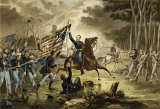Would the south have lost at gettysburg if not for picketts charge?
replied to: steveray
Replied to: Would the south have lost at gettysburg if not for picketts...
By the third day, the day of Pickett's charge, General Lee's Army of Northern Virginia was in no position to improve its position on the battlefield or the campaign. The best they could have hoped for was a stalemate. The opportunities to win at Gettysburg were lost on day one and two when they had superior numbers. By day three the Army of the Potomic had consolidated all of its force on the battlefield in a strong defensive position.
Lee's pride and regard for the army's morale would not allow him any other option but to attack. They came this far on a gamble. This campaign was to change the course of the war. Perhaps bring it to an end. It would have failed regardless of who or how an attack was made either again on the right, the left, or the center with Maj. General Pickett. Lt. General Longstreet, I Corps, knew it was a forlorn hope. He tried to convince Lee otherwise by suggesting they leave the battlefield and try flanking the Federals on the right (south) and inserting themselves between the enemy and Washington.
I'm of the opinion the entire campaign was lost when Stuart's Calvary Corp lost contact with the Army of Northern Virginia. Lee was groping blindly. He did not know the terrain nor of the disposition of the enemy. If he had, Gettysburg would have likely been a one day minor battle victory for him. He was confronted by a small fraction of the Army of the Potomic. Major General Ewell, II Corps, was less than bold on the first day when his forces arrived from the north to extend the Confederate left. If he had pushed forward with elan on the Union's right at Culp's Hill, then victory would have been assured. But he allowed caution to guide his military decisions. During the night with more Federal reinforcements arriving, Culp's Hill and most of the high ground was firmly in their hand and victory for Lee begin to slip away. Otherwise, with the Union Army approaching from the South and Lee in possession of the high ground, then it would be Union General Meade who would decide to attack or not the enemy occupying the high ground. I believe Mead would have declined.

